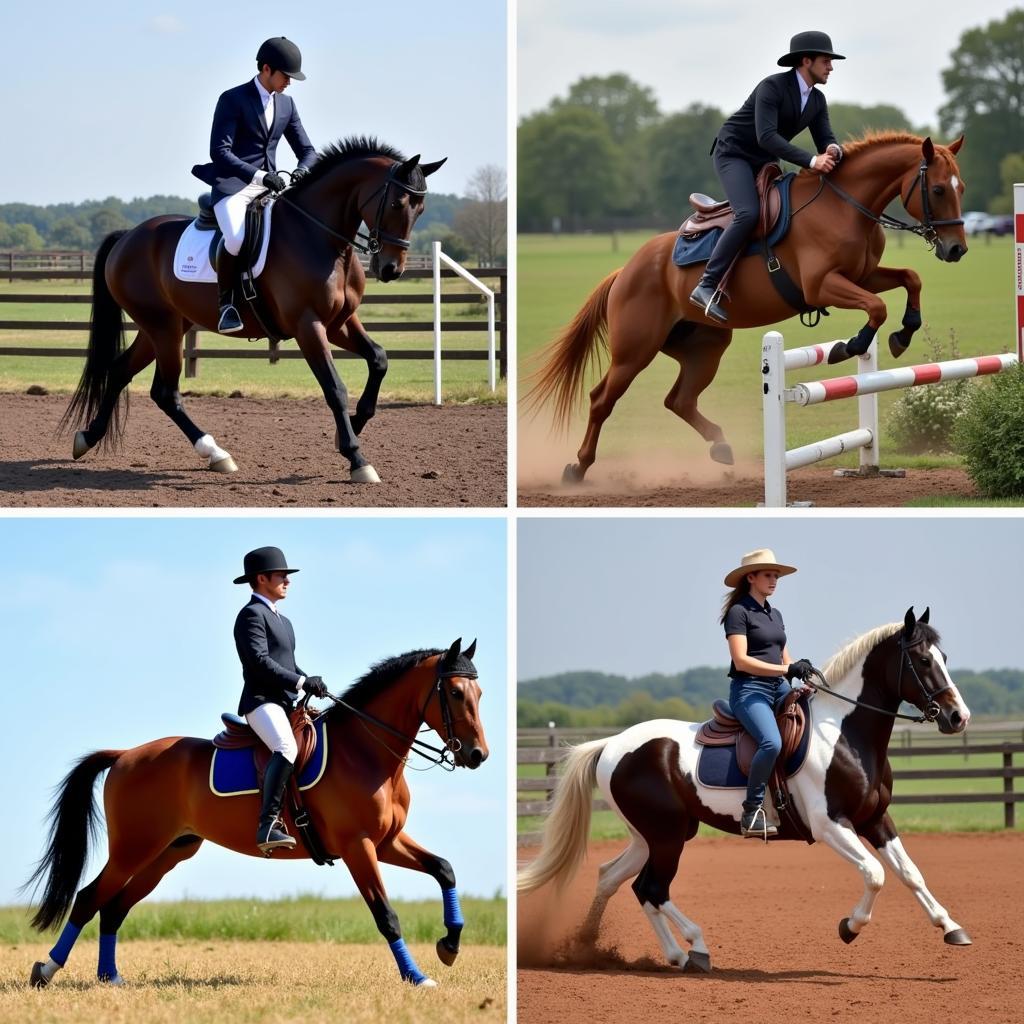Finding the right horse can be a thrilling yet daunting experience, especially with so many breeds and disciplines to consider. Whether you’re an experienced equestrian or a first-time horse owner, understanding what makes a “Horse Top” depends entirely on your individual needs, riding style, and experience level. This comprehensive guide will delve into the crucial factors to consider when choosing the best horse for you.
Understanding Your Needs and Goals
Before you start browsing horse ads or visiting stables, take some time to reflect on your riding aspirations and capabilities.
- Riding Discipline: Are you drawn to the elegance of dressage, the thrill of jumping, the camaraderie of trail riding, or the fast-paced action of barrel racing? Different disciplines require horses with specific temperaments, gaits, and athletic abilities.
- Experience Level: Honesty about your riding skills is paramount. A seasoned horse is often best for beginners, while experienced riders might seek a more sensitive and responsive mount.
- Time Commitment: Horses require significant time, care, and financial investment. Consider how much time you can realistically dedicate to riding, training, and general horse care.
- Budget: Owning a horse is a considerable financial responsibility. Factor in costs for purchasing, boarding, veterinary care, farrier services, feed, and equipment.
 Horse Breeds and Disciplines
Horse Breeds and Disciplines
Key Factors to Consider When Evaluating a Horse
Once you have a clear picture of your requirements, you can begin assessing potential horses based on the following factors:
Breed and Conformation
Each horse breed possesses unique characteristics, temperaments, and predispositions for certain disciplines. For instance, Arabian horses are renowned for their endurance and often excel in endurance riding, while Warmbloods are favored for dressage and show jumping. Conformation, which refers to the horse’s physical structure and build, also plays a crucial role in its suitability for specific activities.
Temperament and Trainability
A horse’s temperament is crucial in determining compatibility with its rider. Consider factors such as:
- Temperament Levels: Horses are often categorized as hot-blooded, warm-blooded, or cold-blooded based on their temperament. Hot-bloods tend to be more spirited and sensitive, while cold-bloods are generally calmer and more docile.
- Handling and Ground Manners: Observe how the horse behaves while being led, tied, groomed, and saddled. A well-mannered horse will cooperate during handling and exhibit respect for human space.
Soundness and Health
A pre-purchase veterinary examination is essential to assess the horse’s overall health and soundness. This examination typically includes:
- Physical Examination: The veterinarian will check the horse’s overall condition, including its heart rate, respiratory system, eyes, teeth, and limbs.
- Lameness Evaluation: A thorough lameness evaluation will help identify any existing or potential issues affecting the horse’s movement.
- Diagnostic Imaging: X-rays or ultrasounds may be recommended to further investigate any areas of concern.
Riding Assessment
It’s crucial to ride any horse you’re considering purchasing to assess its suitability for your riding skills and discipline. Pay close attention to the following:
- Gaits: Evaluate the horse’s walk, trot, and canter for smoothness, rhythm, and responsiveness to cues.
- Steering and Responsiveness: Assess how well the horse responds to your leg, rein, and seat aids.
- Temperament Under Saddle: Observe the horse’s demeanor and willingness to work under saddle.
Making the Right Choice
Choosing the right “horse top” is an incredibly personal decision. While this guide provides a comprehensive overview of essential factors, remember that finding the perfect match often involves intuition and a connection that goes beyond a checklist.
Expert Insight: “It’s important to remember that horses are living beings with individual personalities and needs,” says renowned equine veterinarian Dr. Sarah Williams. “Take your time, ask questions, and trust your instincts. The right horse will enhance your riding experience and become a cherished companion.”
FAQs About Choosing the Right Horse
1. What is the best horse breed for a beginner rider?
Several breeds are known for their gentle temperament and suitability for beginners, including the American Quarter Horse, the Morgan Horse, and the Appaloosa.
2. How much does it cost to own a horse?
The cost of horse ownership varies greatly depending on location, boarding options, and individual horse needs. On average, expect to budget several thousand dollars annually.
Need Help Finding Your Perfect Horse?
Choosing the right horse is a significant decision. At Justus Horses USA, we’re dedicated to helping you find your perfect equine partner. Contact us today at 0772127271, email us at [email protected], or visit our stable located at QGM2+WX2, Vị Trung, Vị Thuỷ, Hậu Giang, Việt Nam. Our team of experts is available 24/7 to assist you.